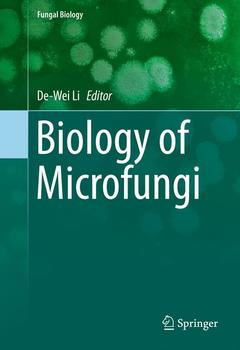Description
Biology of Microfungi, Softcover reprint of the original 1st ed. 2016
Fungal Biology Series
Coordinator: Li De-Wei
Language: English
Subjects for Biology of Microfungi:
Keywords
Publication date: 03-2016
Support: Print on demand
Publication date: 04-2018
Support: Print on demand
Description
/li>Contents
/li>Biography
/li>Comment
/li>
Table of Contents
Preface
1. Introduction –advances and predicament
2. Recent changes in fungal nomenclature and their impact on naming of microfungi
3. Future perspectives and challenges of fungal systematics in the age of big data.
4. Molecular techniques in mycological studies and sequence data curating: quality control and challenges
5. Challenges and future perspectives in the systematics of Kickxellomycotina, Mortierellomycotina, Mucoromycotina, and Zoopagomycotina
6. Entomophthoromycota: a new overview of some of the oldest terrestrial fungi
7. Latest developments in the research of rust fungi and their allies (Pucciniomycotina)
8. Conidiogenesis: its evolutionary aspects in the context of a philosophy of opportunity (lectics)
9. Fungal diversity of Central and South America
10. Mesofungi
11. Evolution of fungi and update on ethnomycology
12. Phylogenetic diversity of fungi in the sea including the Opisthosporidia
13. Biology and ecology of freshwater fungi
14. Dispersal strategies of microfungi
15. Microfungi in indoor environments: what is known and what is not?
16. Biology of the whiskey fungus
17. Allergenic microfungi and human health: a review on exposure, sensitization, and sequencing allergenic proteins
18. What’s old is new: Recognition of new fungal pathogens in the era of phylogenetics and changing taxonomy and implications for medical mycology
19. Mycotoxins in food and feed: a challenge for the 21st century
20. Inhalation exposure and toxic effects of mycotoxins
21. Fungi in fermentation and biotransformation systems
22. Microfungi in biofuel and bioenergy research
23. Interactions of microfungi and plant parasitic nematodes
24. Pathogenic microfungi associated with Spartina in salt marshesIndex
.
First comprehensive volume of its kind
Written by an international group of leading scholars
Provides the latest research and techniques related to microfungi
Includes supplementary material: sn.pub/extras
These books may interest you

Systematics and EvolutionPart B 158.24 €

Systematics and EvolutionPart A 158.24 €


